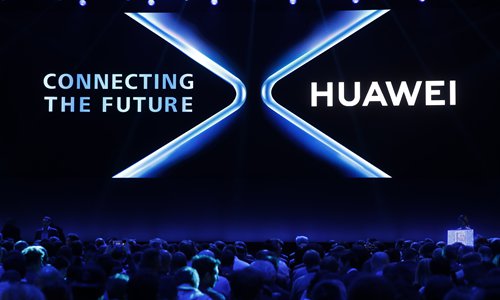HOME >> BUSINESS
Huawei activates backup chipsets
By Chen Qingqing Source:Global Times Published: 2019/5/17 22:28:40
Semiconductor subsidiary has long been preparing for difficult scenario

A digital screen displays a Huawei logo during a Huawei launch event ahead of the MWC Barcelona in Spain on Feburary 24. Photo: VCG
US export controls have not frightened Chinese tech giant Huawei Technologies, but rather inspired Chinese people to stay resilient amid the China-US trade spat, as reflected in Huawei's announcement to use its backup chipsets.
In an internal letter seen by the Global Times on Friday, He Tingbo, president of HiSilicon, a semiconductor company owned by Huawei, said it has been preparing for this scenario for a very long time. He said the company has a backup plan because it assumed the need to survive years ago.
"One day, if advanced chipsets and technologies from the US will not be available, Huawei will be able to continue serving its customers," she said.
The US Commerce Department said Wednesday it is adding Huawei and its 70 affiliates to the Entity List, which will ban the Chinese telecom giant from buying parts and components from US companies without US government approval.
Huawei said it opposes the decision made by the Bureau of Industry and Security of the department, which will also harm US companies.
Among 90 unveiled core suppliers of Huawei, 33 are from the US. Shares of major Huawei suppliers opened lower in early trading on Friday. Qualcomm shares dropped 1.73 percent while Intel's also slumped 0.1 percent in early trading.
According to the letter, the US disrupted global technological cooperation and supply chains, and without any concrete evidence made a "mad decision" to put Huawei into the Entity List.
"All our backup products are now being used. Our long-term efforts will ensure continuous product supply," He said.
China's chip-making industry was cheered up by Huawei's direct response to the US, which reflects its determination to overcome difficulties and push forward self-developed technologies.
Some of the major chipset and component makers saw their shares climb on Friday. Shares of ArcherMind Technology Nanjing Co and Zhejiang Firstar Panel Technology Co all hit their trading ceiling of a 10 percent increase.
"Huawei's resilience can be seen as China's 'Two Bombs, One Satellite' spirit in new era, calling for greater self-reliance in the quest for core technological breakthroughs," said Xiang Ligang, director-general of the Information Consumption Alliance.
"Two Bombs, One Satellite" refers to China's successful tests of the nuclear and hydrogen bombs and the launch of its first satellite into space during the 1960s and 70s. The project was seen as the core of cutting-edge science and technology for China's national defense. Thousands of scientists were dedicated to the country's scientific and defense research in the event of a US blockade.
Like many scientists who stayed low-profile and were hardly known by the public at that time, Huawei's HiSilicon staff had maintained obscure for a very long time, although the Shenzhen-based tech giant had begun working on its own chipset design in the 1990s.
Determined attitude
The Donald Trump administration has been targeting Huawei for a year amid the escalating trade war between China and the US. It has also pressured other countries, urging them to drop Huawei products in the 5G roll-out for so-called national security reasons.
"Huawei has made plans for core chipsets by increasing inventories since last year, and it has prepared for a one-year grace period to face the US sanctions," a source close to the matter told the Global Times.
From chipsets to operating systems, the Chinese tech giant has been continuously investing in research and development (R&D), with more than $15 billion every year.
HiSilicon has already made some major breakthroughs, such as Huawei's first mobile AI computing platform Kirin 970, which has been used in its smartphone products.
This internal letter has also been widely circulated and viewed by Chinese netizens on Friday. Some said they have been deeply touched by the company's strong and determined attitude in confronting a superpower like the US.
The topic has been viewed 310 million times on Sina Weibo and has received 123,000 discussions as of press time.
"Confidence stems from capability. Huawei has far-reaching plans, which is very respectful," a Weibo user wrote. The post gained 271,000 likes.
Damage to global tech
US export controls also cast a shadow over stalled trade talks between the two economies, as both sides exchange tough rhetoric.
The move to cut ties between Chinese and American tech companies will disrupt the global supply chain. "China is the largest smartphone market, largest automaker, and a major electronics market. How will they [US firms] survive if they won't sell their chip products to the Chinese market?" a veteran industry representative in the chip-making sector surnamed Liu told the Global Times on Friday.
In 2018, the market scale of the chip-making sector in the Chinese mainland surpassed 653.2 billion yuan ($94.5 billion), in which more than 30 percent was contributed by foreign companies, Wang Xinzhe, a senior official of the Ministry of Industry and Information Technology, told an industry event on Friday.
"Chip-making is a highly integrated sector, which needs global collaboration. Global industry growth also needs China's participation, which is a major manufacturing hub and the largest chipset market," the official said.
Some analysts believe Huawei has already come up with mature plans to ensure supply in the incident that the US forbids its companies from providing their products to the Chinese firm, and that the letter was also seen as a move to strengthen confidence in the supply chain.
"HiSilicon can't make all chipset and core components. Besides a sufficient inventory, Huawei is likely to have non-American suppliers," Liu said.
Posted in: INDUSTRIES